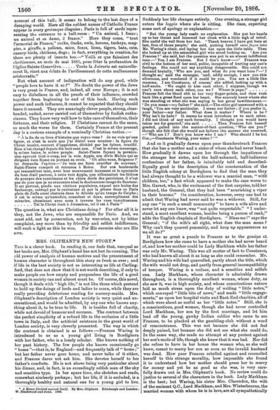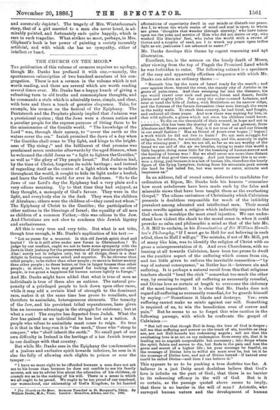MRS. OLIPHANT'S NEW STORY.*
THIS is a clever book. In reading it, one feels that, unequal as her books are, Mrs. Oliphant's hand has not lost its cunning. The old power of analysis of human motives and the presentment of human character is throughout this story as fresh as ever ; and if life in the best society is not so interesting as life at Carling- ford, that does not show that it is not worth describing, if only to make people see how empty and purposeless the life of a good woman in society can and almost must be. Of course, this novel, though it deals with " high life," is not like those which pretend to hold up the doings of lords and ladies to scorn, while they are really providing deleterious reading for nursery-maids. Mrs. Oliphant's description of London society is very quiet and un- sensational, and would be admitted, by any one who knows any- thing about it, to be true to life. It is besides full of charity, while not devoid of humour and sarcasm. The contrast between the perfect simplicity of a refined life in the seclusion of a little town in Italy, and the artificial existence in the great world of London society, is very cleverly presented. The way in which the contrast is obtained is as follows :—Frances Waring is introduced to us as a young girl living in Bordighera with her father, who is a lonely scholar. She knows nothing of her past history. The few people she knows occasionally go " home "—that is, to England—and frequently talk of " home ;" but her father never goes home, and never talks of it either, and Frances dares not ask him. She devotes herself to her father's comforts. He is not above being very particular about his dinner, and, in fact, is an exceedingly selfish man of the shy and sensitive type. In her spare time, she sketches and reads, somewhat aimlessly perhaps ; but her life, if it is secluded, is a thoroughly healthy and natural one for a young girl to live.
• A House Ditided against Itself. By Mrs. Oliphant. Edinburgh and London: W. Blackwood and Bone. 1886. Suddenly her life changes entirely. One evening, a strange girl
enters the loggia where she is sitting. She rises, expecting some sort of apology or explanation :—
" But the young lady made no explanation. She put her hands up to her throat and loosened her cloak with a little sigh of relief.
She undid the veil from her hat. Thank heaven I have got here at last, free of those people,' she said, putting herself sans Jason into Mr. Waring's chair, and laying her bat upon the little table. Then she looked up at the astonished girl who stood looking on. Are yon Frances ' she said, but the question was put in an almost indifferent, tone.—' Yes, I am Frances. But I don't know—' Frances was civil to the bottom of her soul, polite, incapable of hurting any one's feelings. She could not say anything disagreeable. She could not demand brutally, Who are you, and what do you want here ?'—' I thought so,' said the stranger, ' and, oddly enough, I saw you this afternoon, and wondered if it could be you. You are a little like- mamma. I am Constance, of course,' she added, looking up with a half-smile. We ought to kiss each other, I suppose, though we can't care about each other, can we ? Where is papa ?' Frances felt the blood ebb to her very finger-points, and then rush back like a great flood upon her heart. She scarcely knew where she- was standing or what she was saying in her great bewilderment.- ' Do you mean—my father ?' she said.—The other girl answered with a laugh, 'Yon are very particular. I mean our father; if you prefer it, your father—my father. What does it matter ? Where is he ? Why isn't he here ? It seems he must introduce us to each other. I did not think of any such formality. I thought you would have-
taken me for granted,' she said Then Frances felt herself goaded, galled into the matter-of-fact question, Who are you ?' though she felt that she would not believe the answer she received. —` Who am I ? Don't you know who I am ? Who should I be but Con.,—Constance Waring, your sister ? ' " And so it gradually dawns upon poor thunderstruck Frances that she has a mother and a sister of whom she had never heard. How gradually it dawns upon her through the impatience of the stranger her sister, and the half-ashamed, half-ludicrous confessions of her father, is inimitably told and described- Equally good is the description of the consternation of the little English colony at Bordighera to find that the man they had always thought to be a widower was a married man, " with children, too," a fact which appeared to make the case worse to Mrs. Garnet, who, in the excitement of the first surprise, told her husband, the General, that they had been "nourishing a viper in their bosoms." On consideration, however, every one had to admit that Waring had never said he was a widower. Still, for any one "in such a small community" to have a wife alive and never let any one know, was " not quite respectable." " I under- stand, a most excellent woman, besides being a person of rank,' adds the English chaplain of Bordighera. " Bless me !" says the General ; " if the wife's all right, what does the man mean ? Why can't they quarrel peaceably, and keep up appearances as we all do ?"
It was as great a puzzle to Frances as to the gossips at.
Bordighera how she came to have a mother she had never heard of, and how her mother could be Lady Markham while her father was only Mr. Waring. This was all matter of fact to Constance, who had known all about it as long as she could remember. Mr. Waring and his wife had quarrelled, partly about the title, which.
the wife would not drop, and partly from general incompatibility of temper. Waring is a recluse, and a sensitive and selfish one. Lady Markham, whose character is admirably drawn throughout, is a thoroughly excellent woman, whose duty, as she saw it, was in high society, and whose conscientious nature laid as much stress upon the duty of writing " little notes," which conveyed " little bits of news," and made " little engage- ments," as upon her hospital visits and East-End charities, all of which were about as useful as her "little notes." Still, she is a conscientious, good woman, though she had never controlled Lord Markham, her son by the first marriage, and let him lead off the young, gawky Indian soldier who came to see. Frances, to be plucked at the gambling-club without a word of remonstrance. This was not because she did not feel deeply pained, but because she did not see what she could do. In the same way, she made no attempt at any protest against
her son's mode of life, though she knew that it was bad. Nor did she refuse to have in her house the woman who, as she well knew, meant to marry her son as soon as the invalid husband was dead. How poor Frances rebelled against and reconciled. herself to this strange morality, how impossible she found it to understand how her mother should press her to marry for money and yet be as good as she was, is very care- fully drawn out in Mrs. Oliphant's book. No review could do.
justice to several of the characters in the book. Lady Markham is the best ; but Waring, his sister Mrs. Clarendon, the wife of the eminent Q.C., Lord Markham, and Mrs. Winterbourne, the married woman with whom he is in love, are all sympathetically and accurately depicted. The tragedy of Mrs. Winterbourne's story, that of a girl married to a man she never loved, is ad- mirably painted, and fortunately ends quite happily, which is rare in such tragedies. What strikes us most, perhaps, in Mrs. Oliphant's book is her power of painting a society incurably artificial, and with which she has no sympathy, either of intellect or heart.



































 Previous page
Previous page